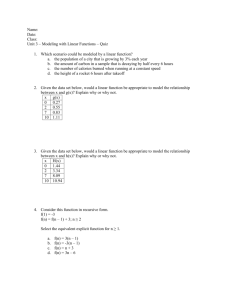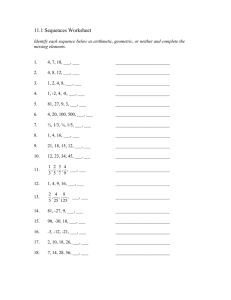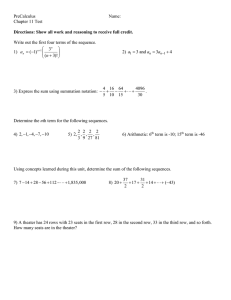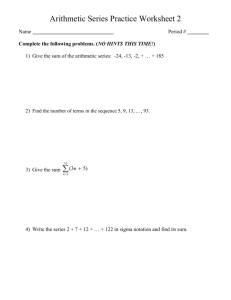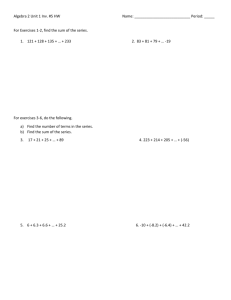Directions: Unit two section one Row One, Seats 1, 2 and 3
advertisement
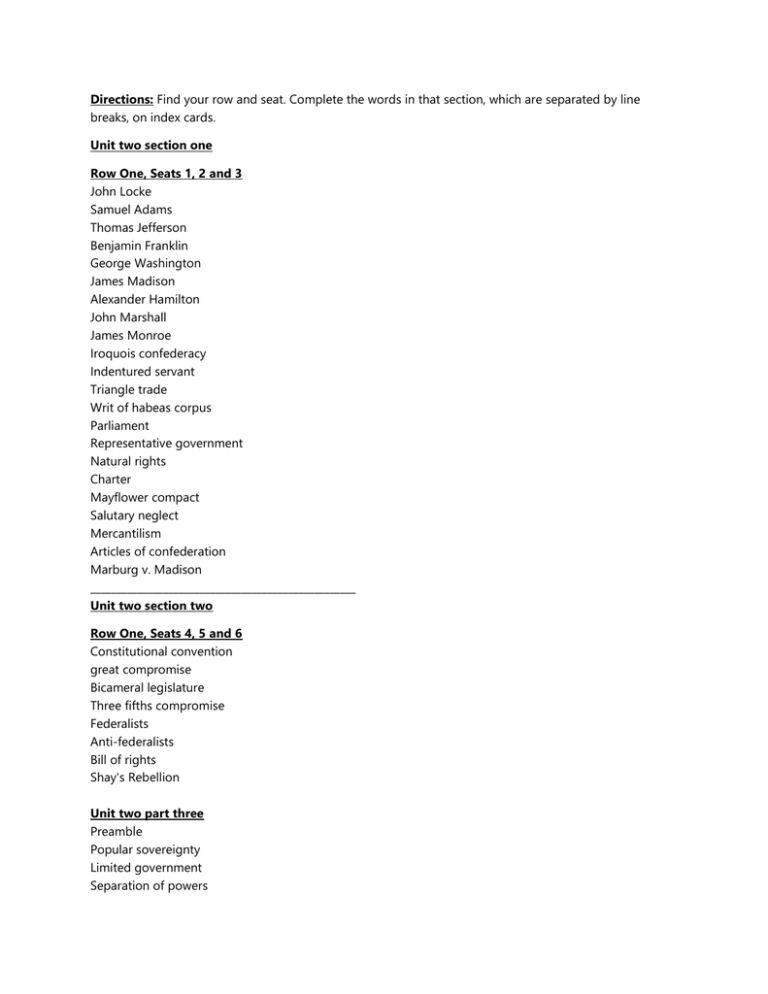
Directions: Find your row and seat. Complete the words in that section, which are separated by line breaks, on index cards. Unit two section one Row One, Seats 1, 2 and 3 John Locke Samuel Adams Thomas Jefferson Benjamin Franklin George Washington James Madison Alexander Hamilton John Marshall James Monroe Iroquois confederacy Indentured servant Triangle trade Writ of habeas corpus Parliament Representative government Natural rights Charter Mayflower compact Salutary neglect Mercantilism Articles of confederation Marburg v. Madison ___________________________________________________ Unit two section two Row One, Seats 4, 5 and 6 Constitutional convention great compromise Bicameral legislature Three fifths compromise Federalists Anti-federalists Bill of rights Shay's Rebellion Unit two part three Preamble Popular sovereignty Limited government Separation of powers Checks and balances Elastic Clause Necessary and proper Unwritten constitution Delegated powers Implied powers Concurrent powers Reserved powers ___________________________________________________ Row Two, Seats 1, 2 and 3 Legislative Executive Judicial Electoral college Bureaucracy Amendment Due process of law Unit two part five Cabinet National bank Excise tax Protective tariff Alien and sedition acts Strict constructionists Loose constructionists Judicial review Federalists Democratic republicans Monroe doctrine Jay's Treaty Proclamation of neutrality Louisiana Purchase ___________________________________________________ Row Two, Seats 4, 5 and 6 Unit two section two Andrew Jackson Martin van Buren Frederick Douglas Harriet Tubman Sojourner Truth Susan B. Anthony Lewis and Clark Abraham Lincoln Robert E. Lee Ulysses S. Grant Industrial revolution Potato famine Nativism Spoils system Tariffs National bank Removal policy Trail of Tears. Abolitionists Underground Railroad Women's Rights Convention Manifest Destiny Popular sovereignty ___________________________________________________ Row Three, Seats 1, 2 and 3 Secede Confederate states of America Emancipation proclamation Fred Scott v. Sanford Cotton gin Mexican War Fugitive slave laws Bleeding Kansas Lincoln Douglas Debates Kansas Nebraska Act Transcontinental Railroad Battle of Gettysburg Unit three section one Andrew Johnson Ulysses S. Grant William "Boss" Tweed Booker T. Washington Thomas Nast W. E. B. Du Bois Reconstruction Radical republicans Radical reconstruction Scalawags Carpetbaggers ___________________________________________________ Row Three, Seats 4, 5 and 6 Thirteenth amendment Fourteenth amendment Fifteenth amendment Compromise of 1877 Black codes Ku Klux Klan Poll taxes Literacy tests Freedmen's Bureau Segregation Jim Crow Laws Plessy v. Ferguson Brown v. The Board of Education Unit three Section two Andrew Carnegie John D. Rockefeller J. P. Morgan Henry ford Charles Darwin Transcontinental railroad Sharecroppers Tenant Farmers Capital Corporations ___________________________________________________ Row Four, Seats 1, 2 and 3 Monopoly Merger Trust Entrepreneurs Assembly line Laissez Faire Robber barons Sherman Antitrust Act Collective bargaining Boycotts Mann v. Illinois Unit three section three John Dewey William Jennings Bryant Tenement Political machines Settlement houses Suffrage Ghettos Reservations Dawes act Agricultural revolution Grange ___________________________________________________ Row Four, Seats 4, 5 and 6 Populist Free silver Middle class Melting pot theory Unit four section one Uptown Sinclair Jacob Riis The jungle How the other half lives Booker T. Washington W. E. B. Du Bois Marcus Garvey Theodore Roosevelt Woodrow Wilson Progressive Era Gilded Age Muckrakers prohibition Direct primary Direct elections of senators Square deal Trust busting Federal reserve system ___________________________________________________ Row Five, Seats 1, 2 and 3 Lochner v. New York Muller v. Oregon Standard Oil Unit four section two Open Door Policy Imperialism Roosevelt Corollary Dollar diplomacy Fourteen points Treaty of Versailles League of Nations Reparations Shenck v. United States l Yellow journalism Sinking of the Maine Spanish American war Big Stick policy Panama Canal Good Neighbor Policy Causes of World War I - MAIN Propaganda U Boats Lusitania Espionage and Sedition Act The Red Scare ___________________________________________________ Row Five, Seats 4, 5 and 6/7 Unit five section one Great Migration Mass consumption Consumer goods Flapper Harlem Renaissance Jazz age Eighteenth amendment Twenty-first amendment Scopes Trial Calvin Coolidge Henry Ford F. Scott Fitzgerald Ernest Hemingway Langston Hughes Duke Ellington Teapot Dome Scandal Unit Five section two Great Stock Market Crash Great Depression Overproduction Underconsumption Distribution of wealth Trickle down economics Hoovervilles ___________________________________________________ Row Six, Seats 1, 2 and 3 Dust Bowl New Deal Bank Holiday Collective Bargaining Herbert Hoover John Steinbeck Franklin D. Roosevelt Eleanor Roosevelt Schecter Poultry Corporation v United States Emergency Banking Act Federal Emergency Relief Act Public Works Administration Home Owners Loan Corporation First Agricultural Adjustment Act Federal Housing Administration Securities Exchange Act Social Security Act National Labor Relations Act Fair Labor Standards Act Unit six section one Adolf Hitler Benito Mussolini Francisco Franco Robert Oppenheimer ___________________________________________________ Row Six, Seats 4, 5 and 6/7 Harry S. Truman Joseph Stalin Winston Churchill Totalitarianism Fascism Appeasement Lend lease act Allies Axis power Manhattan project Holocaust Rosie the riveter Nisei WRA Camps Cash and carry Pearl Harbor Wartime relocation authority Korematsu v. United States GI Bill Employment Act of 1946 The Taft Hartley Act Baby Boom ___________________________________________________ Unit six lesson two George C. Marshall Mao Zedong Chiang Kai-Shek Joseph McCarthy Containment Iron curtain Truman doctrine Marshall plan Cold War NATO Warsaw Pact 38th Parallel HUAC United Nations Soviet Union Universal Declaration of Human Rights The Smith Act McCarthyism Hiss Case ___________________________________________________ Unit seven lesson one Dwight D. Eisenhower Nikita Khrushchev Fidel Castro Jackie Robinson Rosa parks Martin Luther king Jr. Balance of powers Arms race Sputnik Domino theory Eisenhower doctrine Suburbanization Civil rights movement Brown v. The Board of education Montgomery bus boycott
